Employers in England: Get incentive payments for hiring new apprentices
18/11/2020
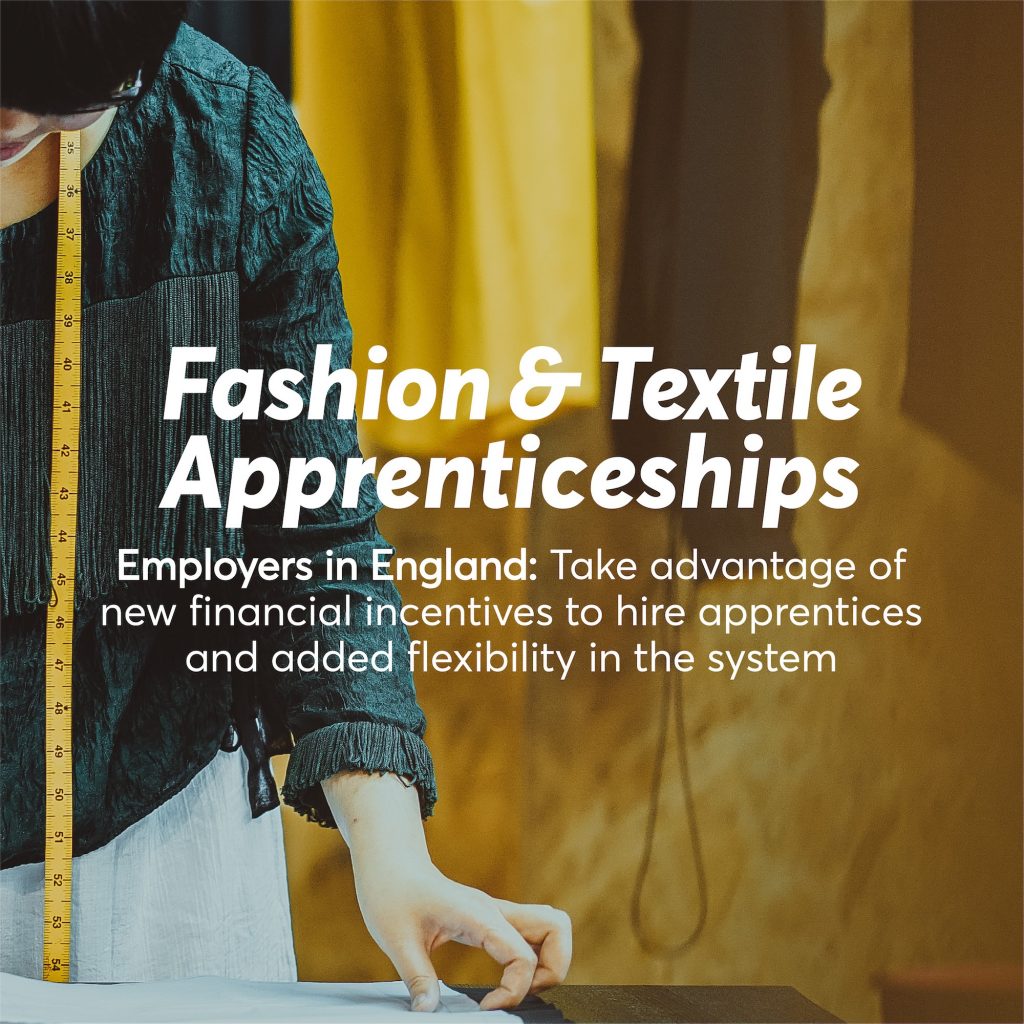
UKFT urges fashion and textile employers in England to take advantage of new financial incentives for hiring apprentices and added flexibility in the system, and calls on businesses to reserve funds for training now.
As the economy recovers from the coronavirus outbreak, the government has recognised that apprenticeships will be more important than ever in helping businesses to recruit the right people, and develop the skills they need to respond to conditions and grow – both now and in the long-term.
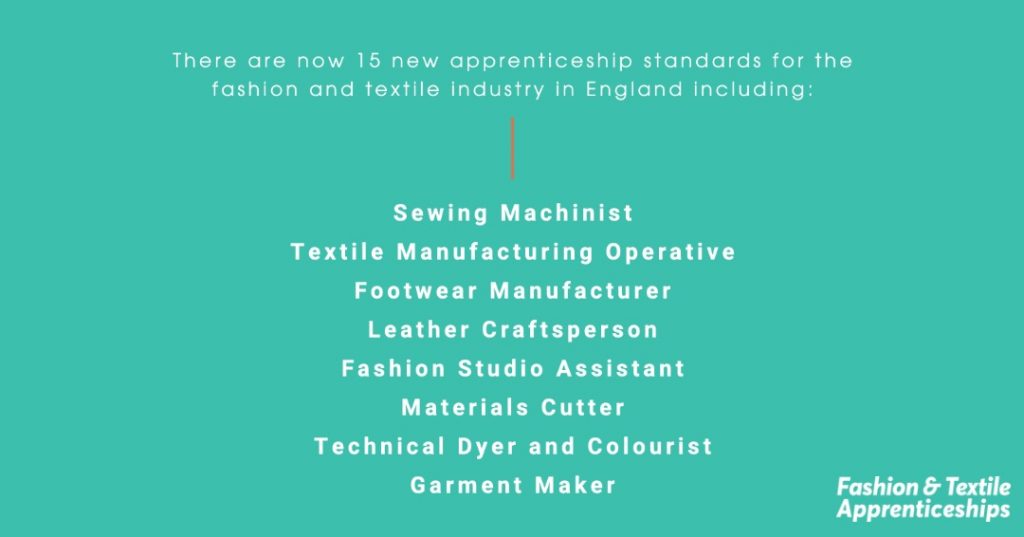 Over the last two years, UKFT has led the development of a new suite of apprenticeship standards to address critical skills gaps in our industry in England. However, there have been a number of issues which have prevented employers accessing this vital training to upskill their businesses.
Over the last two years, UKFT has led the development of a new suite of apprenticeship standards to address critical skills gaps in our industry in England. However, there have been a number of issues which have prevented employers accessing this vital training to upskill their businesses.
UKFT is pleased to confirm there have now been a number of changes to the system, increased financial contributions and added flexibility which will hopefully allow more businesses to recruit apprentices and secure the long-term growth of our industry. The recent changes include:
- Incentive payment of £2,000 for apprentices aged 16-24
- Incentive payment of £1,500 for apprentices aged over 25
- Additional payment of £1,000 for employers taking on a 16-18-year-old
- Additional payment of £1,000 for employers taking on a care leaver aged 19-24
- No contribution to training costs for employers with an annual wage bill under £3m (up to the designated funding band)
- Small Employer Waiver: employers with less than 50 employees can train those aged 16-18 and care leavers aged 19-24 at no cost
- Non-levy employers can reserve funds for 10 apprentices (up from 3 previously)
- Non-levy employers can continue to arrange apprenticeships with training providers which hold existing non-levy contracts with the Education and Skills Funding Agency (ESFA) until 31 March 2021
NOTE: It is not a recent change but many employers may not realise that if you employ an apprentice you may not need to pay employer Class 1 National Insurance contributions (NICs) on their earnings below £827 a week (£43,000 a year). They must be under 25 years old and following an approved UK government statutory apprenticeship framework (frameworks can differ depending on the UK country). There are more details here.
The government announced an incentive payment will be made to employers which hire an apprentice before 31 January 2021. The apprentice must be a new employee to the business, have a contract of employment start date between 1 August 2020 and 31 January 2021 (inclusive) and must not have been employed by the employer within the six months prior to the contract start date.
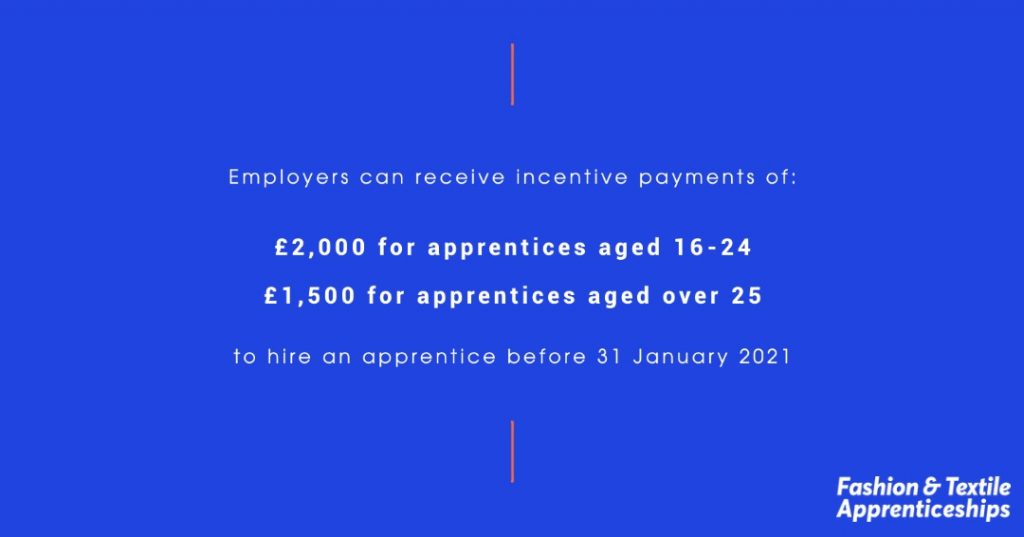
Claims can start to be made by employers in relation to these apprentices from 1 September 2020 through the apprenticeship service. There will be two levels of payment based on age:
- For apprentices aged 16-24, the payment will be £2,000.
- For apprentices aged 25 or over the payment will be £1,500.
The payment will be made directly to employers in two equal instalments, where the apprentice is still in learning at day 90 and day 365.
There will be no limit on the number of incentive payments that an employer can claim for apprentices eligible to receive funding, provided each apprentice meets the criteria, including being a new employee.
There will also be an additional payment of £1,000 for employers take on a 16-18-year-old on an apprenticeship standard, which will be paid to employers in two equal instalments at 90 days and 365 days.
Employers who train an apprentice who is aged 19-24 and has previously been in care or who has a Local Authority Education, Health and Care plan, will receive £1,000 to help with these additional costs in the same way as the payment for 16- 18 year olds.
These payments are made to employers via their training provider, who will pass the money on. These payments come direct from the government and will not be deducted from an employer’s account. Employers which benefit from the small employer co-investment waiver will also receive these payments. These payments are separate from, and therefore in addition to, the incentive payments for hiring a new apprentice, which are paid directly to the employer through the apprenticeship service.
The Small Employer Waiver means employers with fewer than 50 people working for them can train, at no cost, those aged 16-18 or those aged 19-24 who have previously been in care or who have a Local Authority Education, Health and Care plan.
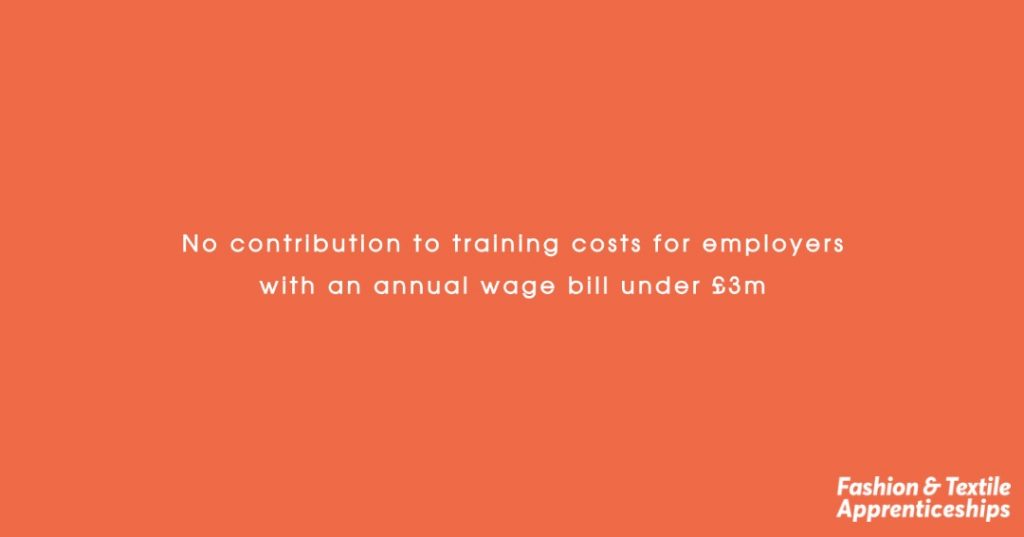
Employers which do not pay the apprenticeship levy (those with annual wage bills under £3m, which make up the vast majority of our industry) are normally required to pay 5% of the total price of the apprentice’s training, with the government covering the remaining 95% of the cost up to the funding band maximum.
Now these employers are not required to contribute the 5% co-investment and instead, the government will pay 100% of the training costs for these individuals up to the funding band maximum. Employers need to meet the full costs above the funding band limit for any apprenticeship.
Previously non-levy employers and training providers have struggled to access funded apprenticeship training in England. However, following consistent lobbying from UKFT, the government has confirmed that the number of ‘active’ or ‘used’ reservations available to non-levy paying employers at any given time will now increase from 3 to 10 for the remainder of the FY2020-21.
This aims to help non-levy paying employers to recruit more apprentices for their businesses through the apprenticeship service. This policy will be kept under review pending further assessment.
Until 31 March 2021, non-levy employers can also continue to arrange apprenticeships with training providers who hold existing non-levy contracts with the ESFA. From 1 Apr 2021 all new starts with non-levy employers will be through the Apprenticeships Service.
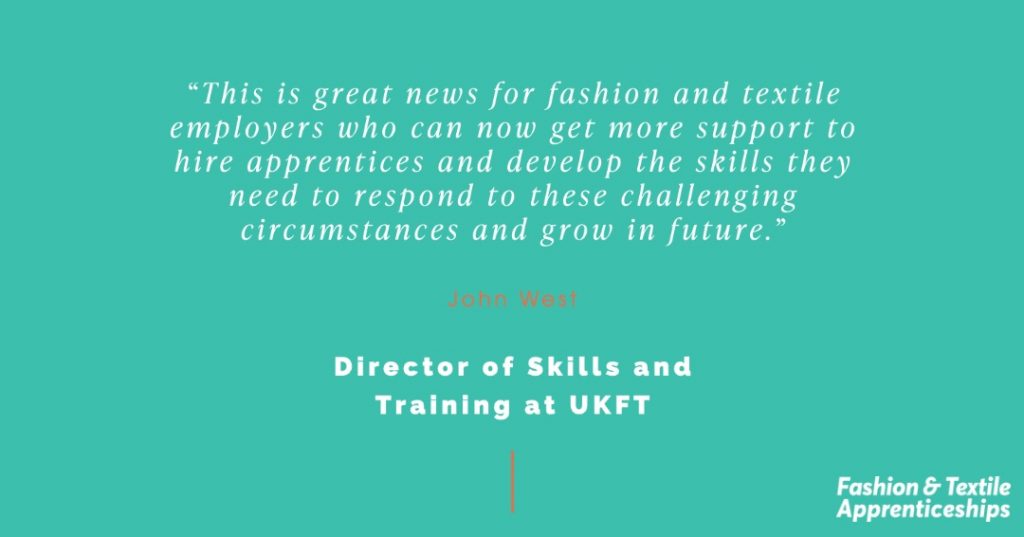
John West, Director of Skills and Training at UKFT, said: “This is great news for fashion and textile employers who can now get more support to hire apprentices and develop the skills they need to respond to these challenging circumstances and grow in future. It is also a game-changer for our training provider network, which can now work directly with non-levy employers to access funded apprenticeship spaces without sub-contracting arrangements (Note – training providers must be classified as Main Providers on the Register of Apprenticeship Training Providers).
“As the industry resets post-covid, these new incentives will ultimately offer more money to deliver the skills and training required for our apprentices.”
Employers: find out how to set up an online account here
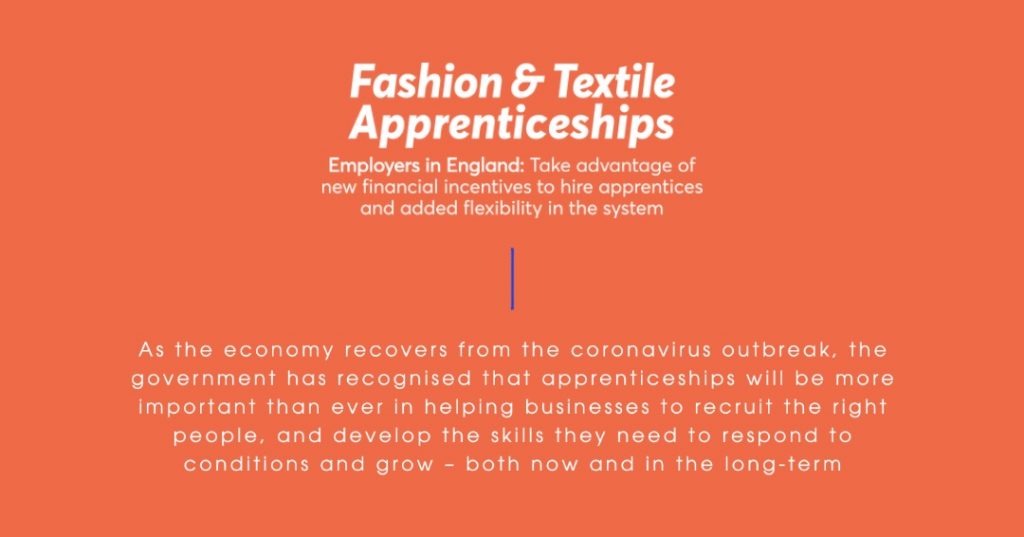
Apprenticeships currently available for the fashion and textile industry in England are as follows:
- Level 2 Textiles Care Operative – ST0604
- Level 2 Textiles Manufacturing Operative – ST0458
- Level 2 Footwear Manufacturer – ST0202
- Level 2 Sewing Machinist – ST0549
- Level 2 Leather Craftsperson – ST0460
- Level 2 Material Cutter – ST0899
- Level 3 Bespoke Saddler – ST0328
- Level 3 Garment Maker – ST0846
- Level 3 Fashion Studio Assistant – ST0173
- Level 3 Fashion and Textiles Pattern Cutter – ST0541
- Level 3 Knitted Product Manufacturing Technician (NEW JUST APPROVED) – ST0910
- Level 4 Textiles Technical Specialist – ST0581
- Level 4 Technical Dyer and Colourist – ST0678
- Level 4 Fashion and Textiles Product Technologist – ST0540
- Level 5 Bespoke Tailor and Cutter – ST0055
UKFT Skills and Training
UKFT is the Sector Skills Body (SSB) for fashion and textiles in England, Scotland, Wales and Northern Ireland. We work with employers, training providers and other stakeholders to raise the skills and productivity of the people who work in our sector to the highest level, ensuring the UK fashion and textile industry remains competitive in a global market.
For Our Members
UKFT can help you identify the right industry training options for your business, offering advice, help with documentation and facilitating links with sector training providers.
As Sector Skills Body, our most recent work involves developing new vocational and academic routes into industry that meet the needs of business, as well as promoting the wide variety of careers in our industry to support the next generation of talented
We work with companies of all sizes from the industry’s biggest global brands through to micro businesses and start-ups, training providers and the relevant government agencies across the UK.
Our remit covers everything from fashion and footwear manufacturing, dyeing and colouring, textile care services and leather work through to pattern cutting, sewing, bespoke tailoring and garment making.
